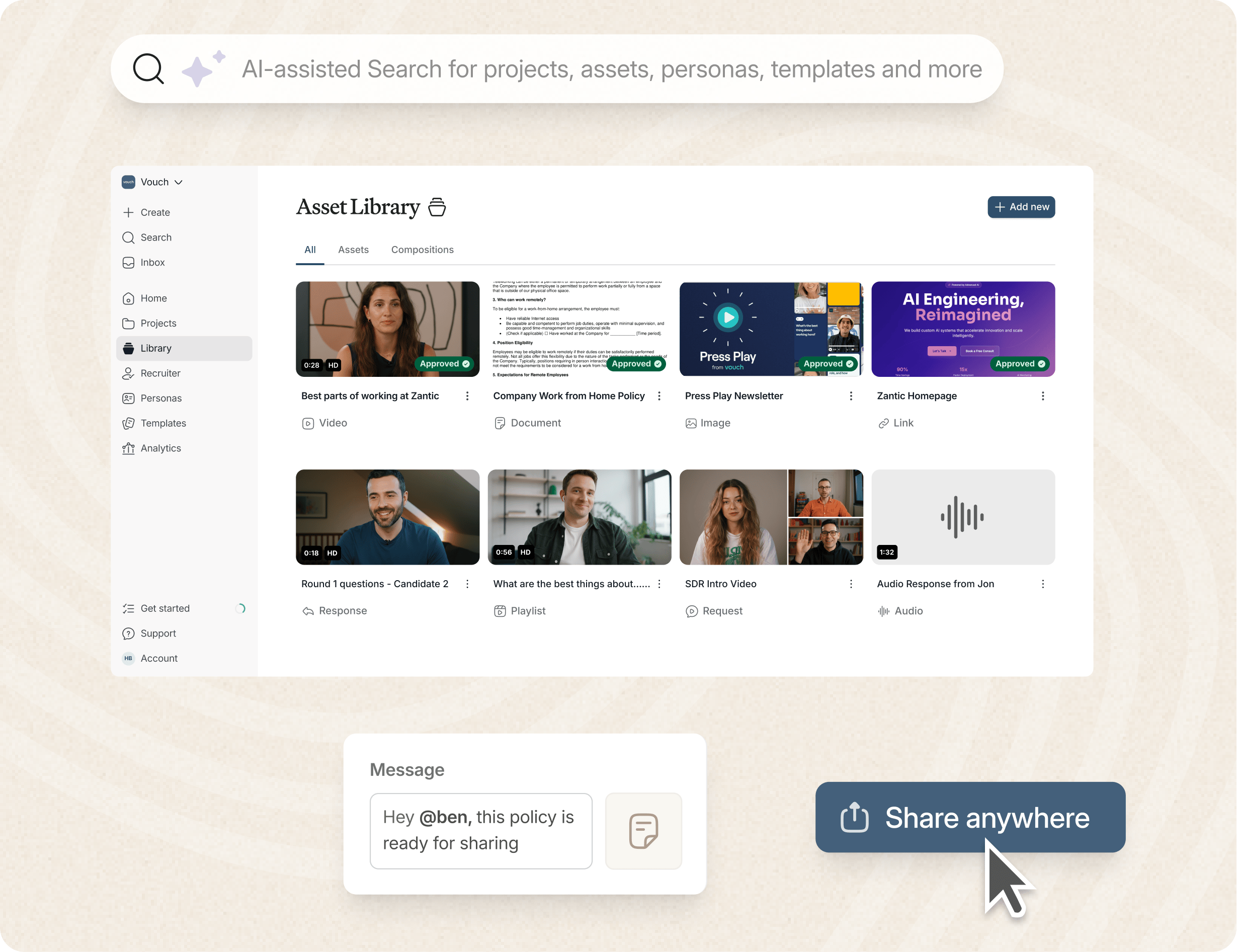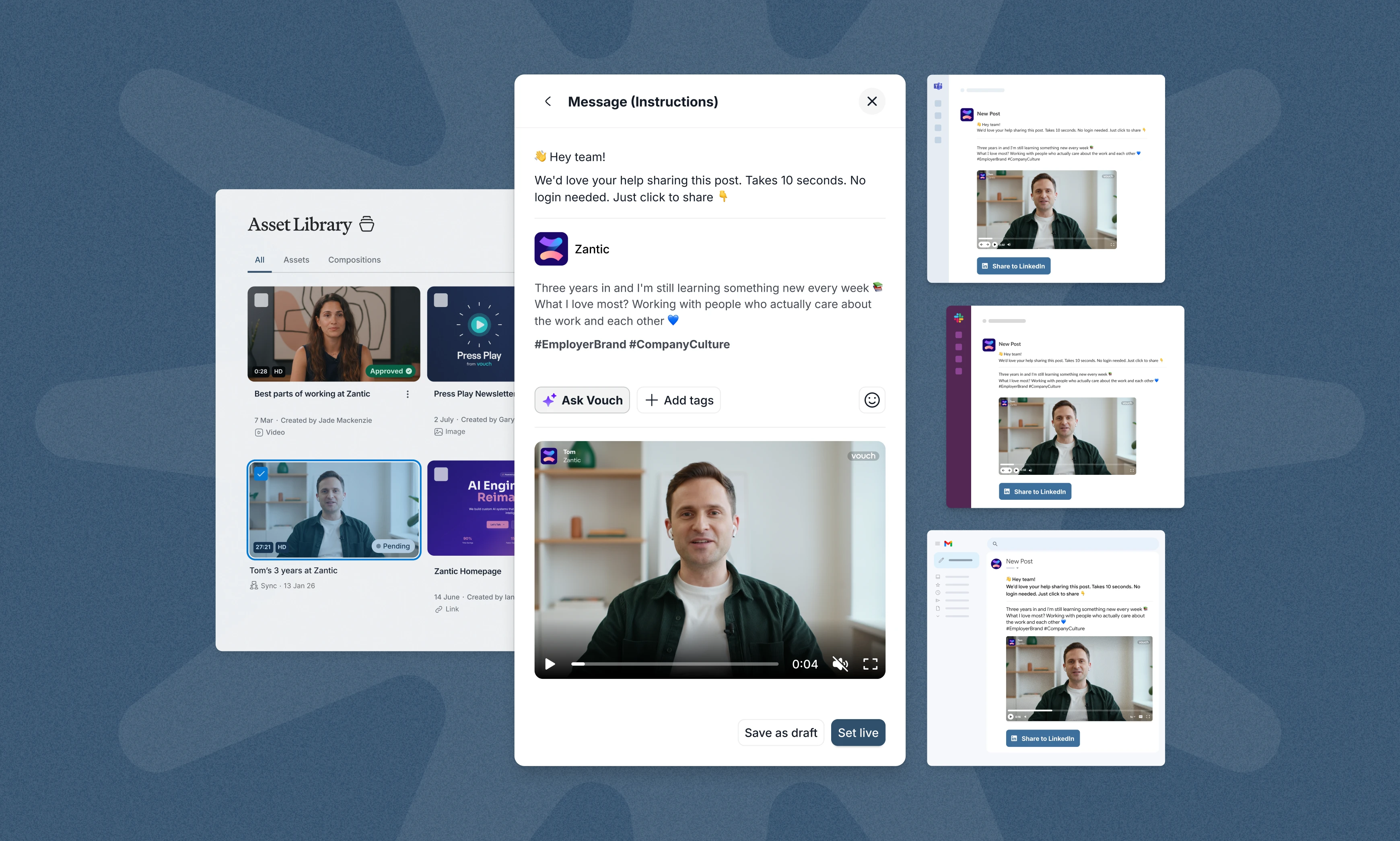Are you working towards your company's long-term hiring success?
In 2026, the key for talent teams lies in "strategic recruiting".
By implementing a well-defined talent acquisition strategy, you can attract top-notch candidates (both active and passive candidates), build a highly talented workforce, and secure long-term success for your organization.
In this article, we will explore the importance of strategic recruiting and how it can benefit your company. We also delve into the principles that guide successful recruitment strategies and the steps you can take to implement them effectively.
Let's dive in.
Key Takeaways:
- Strategic recruiting is crucial for building short and long-term success.
- Strategic recruitment is all about providing a remarkable candidate experience.
- Employer branding and recruitment marketing play a significant role in attracting the right candidates.
- Technology, such as video, AI and automation, can streamline hiring and save your company significant time and costs.
What Is The Importance of Strategic Recruitment?
Strategic recruitment plays a vital role in every company's success.
It's about finding the right people for your company culture, and the talent that can help your business grow and succeed.
By prioritizing strategic recruitment, your company can see benefits like a reduced employee turnover and costs, attracting the right candidates, and creating a more reliable and repeatable talent pipeline. In essence, it's building employee satisfaction and retention rates.
Strategic recruiting also ties directly into your Employer Brand, ensuring applicants feel valued from the very first recruitment stage, happily accept your job offer and remain committed to your company in the long run. Strategic recruitment is designed to create a loyal and motivated workforce, leading to higher productivity and overall success.
The AI-enabled workspace for talent teams.
- Unified workspace for talent teams
- Accelerate hiring with AI tools
- Auto-generate polished hiring and employer brand content
- Easily repurpose assets across all channel

What Are The 7 Principles Of Strategic Recruitment?
Strategic recruitment is a multi-faceted process that requires careful planning and execution. By following these key principles, you can optimize your hiring efforts and attract the best talent for your organization.
1. Defining Your Ideal Employees
When it comes to strategic recruitment, defining your target audience (ideal employee) for each job position is essential. By understanding the specific skills, qualifications, and characteristics you're looking for, you can tailor your recruiting strategies to attract suitable candidates.
2. Building A Strong Employer Brand
Your employer brand is how potential hires perceive your organization. Building a strong employer brand is crucial to attracting and retaining top talent. Highlight your company's values, culture, and unique Employee Value Propositions (EVPs) to stand out in the competitive job market.
3. Set Clear, Achievable Targets
To ensure you optimize your hiring efforts, you need to prioritize your job openings based on urgency and criticality. Set clear targets for each role and establish measurable goals that align with your recruiting strategy. This approach helps you focus your resources and talent team efforts where they are most needed.
4. Build Your Talent Pipeline
Strategic recruitment involves thinking ahead and creating a talent pipeline, attracting active and passive candidates while telling the stories of your current employees. By constantly engaging with potential candidates, you can proactively build relationships and maintain a pool of talented individuals for future roles.
5. Candidate-First Approach
Adopting a candidate-first approach is crucial for providing a positive candidate experience and improving employee retention. Take the time to understand the needs and expectations of candidates and tailor your hiring process accordingly. This approach will differentiate your organization and attract top talent.
6. Technology-Based Processes
Utilizing technology in your recruitment process streamlines candidate screening and hiring. Leverage tools like Video, HR analytics, and recruitment metrics to measure the effectiveness of your efforts and make data-driven decisions. This eliminates biases and ensures better, more diverse hiring outcomes.
7. Access to a Global Pool of Talent
Accessing a global talent pool is more important than ever in today's interconnected world. Embrace technology and use social media platforms such as Facebook, Instagram, Twitter, and even YouTube to reach candidates from different geographical locations and find the perfect fit for your company's needs.
By following these principles, you can establish a strong strategic recruiting process that attracts top talent, enhances your employer brand, and aligns with your business goals. Remember, this recruiting approach is an ongoing effort that requires continuous evaluation and optimization to ensure long-term success.
What Are The Key Steps for Creating A Strategic Recruitment Process?
Implementing a successful hiring process requires careful planning and execution. To ensure you attract top talent and build a strong workforce, follow these steps:
1. Set clear recruitment goals: Clearly define your hiring needs and identify the skills, experience, and qualifications required for each position.
2. Conduct candidate sourcing activities: Utilize various channels, such as job boards, social media, and professional networks, to actively search for and attract potential candidates.
3. Continually work on employer branding: Highlight your company's unique values, culture, and benefits to create a positive image and attract candidates who align with your organization.
4. Utilize HR analytics and recruitment metrics: Measure the effectiveness of your hiring efforts through data analysis. Monitor key metrics, such as time to fill, cost per hire, and quality of hire, to identify areas for improvement.
5. Develop a comprehensive talent acquisition strategy: Align your recruitment process with your overall business goals. Identify long-term talent needs and implement strategies to build a strong talent pipeline.
6. Continuously analyze and optimize: Regularly review and refine your recruiting process to ensure its efficiency and effectiveness. Stay updated with industry trends and adapt your strategies accordingly.
7. Have some fun: Recruitment can be hectic, so enjoying the process is important when developing your hiring strategy. This will also benefit candidates and your employer brand.
By following these steps, you can streamline your hiring process, attract the right candidates, and ultimately make informed hiring decisions that contribute to your organization's long-term success.
What Are 5 Vital Statistics On Strategic Recruiting You Should Know?
Here are five key statistics on strategic recruiting, along with their sources:
1. Increased Complexity in Talent Acquisition: A survey found that 56% of business leaders report that talent acquisition complexity is increasing, driven by global workforces, remote hiring, and evolving regulations. SmartRecruiter
2. Importance of Employer Branding: A strong employer brand can lead to a 43% decrease in recruitment costs, emphasizing the value of maintaining a positive company image to attract top talent. FinancesOnline
3. Impact on Business Performance: 29% of business leaders report that inefficiencies in talent acquisition have slowed sales, affecting overall business performance, particularly in high-turnover industries. SmartRecruiters
4. Use of Social Media in Recruitment: 84% of organizations use social media actively for recruiting talents, indicating the growing importance of digital platforms in sourcing candidates. Recruiterflow
5. Significant HR Budget Allocation: 57% of companies allocate over 40% of their HR budgets to talent acquisition, highlighting the substantial investment in recruitment processes. SmartRecruiters
These statistics underscore the evolving landscape of strategic recruiting, highlighting the need for efficient processes, significant investment, strong employer branding, and the utilization of digital platforms to attract and retain top talent.
The Role of Technology in Strategic Recruitment
Technology has revolutionized the way organizations approach their recruiting efforts.
With the rapid rise of recruiting technology, such as artificial intelligence (AI), and tools like Vouch Video with video automation, companies can streamline hiring processes and make more data-driven decisions.
These technologies offer a range of benefits that can greatly enhance recruiting efforts. Recruitment technology now driven by AI algorithms enables recruiters to reach a wider pool of candidates by intelligently sourcing and screening potential hires in a fraction of the time.
This does more than save time, it also helps you access a global talent pool if you are looking for top talent. Automation further improves efficiency by automating repetitive tasks like scheduling interviews and sending follow-up emails, freeing up recruiters to focus on more strategic aspects of the recruiting process.
Importance of Diversity in Strategic Recruitment
In strategic recruiting, it's important to remember that diversity is key to create innovation and achieving success.
By embracing a diverse talent pool, you open up a world of perspectives that can enhance problem-solving and creativity within your organization. Different backgrounds and experiences bring unique value, creating a more dynamic and inclusive work environment.
Ensuring diversity and inclusion in your recruiting practices can increase employee satisfaction, improve decision-making, and enhance overall performance. Embrace diversity to gain a competitive edge in today's rapidly evolving business landscape.
Utilizing Data for Better Recruitment Decisions
Incorporating data analytics into your strategic recruiting processes can revolutionize and optimize your decision-making. By leveraging metrics and market research, you can identify trends, assess the effectiveness of your hiring strategies, and make data-driven decisions to attract the best talent. By analyzing key performance indicators and applicant data, you can fine-tune your approaches, reduce hiring time, and ensure you target the right candidates for the right roles.
FAQs
How Can We Attract and Engage Passive Candidates in the Hiring Process?
Attracting passive candidates requires a strategic recruitment plan that emphasizes employer branding, showcases company culture, and highlights the employee value proposition. Engaging passive candidates can be achieved through targeted recruitment marketing, leveraging employee referral programs, and offering competitive career opportunities that align with the candidate’s professional goals.
What Are the Key Components of a Successful Recruitment Strategy?
A successful recruitment strategy involves a clear understanding of the ideal candidate profile, strategic use of recruitment tools, and effective sourcing of both active and passive candidates. It also includes building a strong talent pipeline through niche job boards, recruitment events, and employee referrals, ensuring that the pool of candidates is consistently filled with quality talent.
How Can Recruitment Metrics Improve the Hiring Process?
Recruitment metrics provide valuable insights into the effectiveness of recruiting efforts, helping recruitment teams refine their strategies. By tracking metrics such as time-to-hire, interview scheduling efficiency, candidate screening success, and employee retention rates, companies can make data-driven decisions to optimize the recruitment process and achieve their recruitment goals.
How Does Employer Branding Give a Competitive Edge in Attracting Quality Candidates?
Employer branding plays a crucial role in differentiating your company from competitors in the job market. A strong employer brand, aligned with company values and corporate culture, attracts quality candidates by highlighting what makes the organization an attractive place to work. This can lead to a more robust pool of talent and ultimately a stronger talent pipeline.
What Role Do Employee Referrals Play in Building a Talent Pipeline?
Employee referrals are a powerful tool in building a strong talent pipeline. Current employees can recommend qualified candidates who align with the company culture and possess the necessary skill sets. This not only speeds up the recruiting process but also often leads to higher employee satisfaction and retention rates, as referred candidates tend to have a better cultural fit.
How Can Companies Ensure a Positive Candidate Experience During the Recruitment Process?
Ensuring a positive candidate experience involves clear communication throughout the recruitment process, timely follow-up emails, and transparent interview processes. Talent teams should also provide feedback to candidates, maintain a professional and respectful tone during interactions, and align the process with the company’s values to leave a lasting positive impression.
What Are the Benefits of Strategic Hiring Practices for Long-Term Business Goals?
Strategic hiring practices ensure that the right candidates are brought into the company, contributing to long-term business success. By aligning recruiting efforts with business goals, focusing on essential skills, and maintaining a strong employer brand, companies can build a workforce that drives innovation, enhances company culture, and meets future challenges effectively.
Conclusion
Strategic recruiting is the key to long-term success for your organization.
By adopting an organized approach, you can attract the best talent for your company and build your talent pipeline to unlock your company's full potential.
This means taking the time to identify the specific skills and qualities you are looking for in candidates, developing a strong employer brand to attract top talent, and implementing a robust recruitment strategy to ensure long-term success in hiring. By focusing on best recruiting practices, you can fill current roles and prepare for future growth and success in your organization.
Tools like Vouch also make strategic recruiting easier, helping you create video content that captures authentic employer reviews and employee experiences.
See Why Strategic Recruiting Teams Love Vouch!
Loved by companies like Canva, Nike, Cisco, HubSpot, Amazon and more, tools like Vouch make leveraging video in your business remarkably easy.
Be sure to book a Vouch demo today and chat with a video content expert.
You might also like

Elevate Your Brand Today With Vouch
Discover how Vouch can accelerate talent acquisition while helping you stay on-brand.






